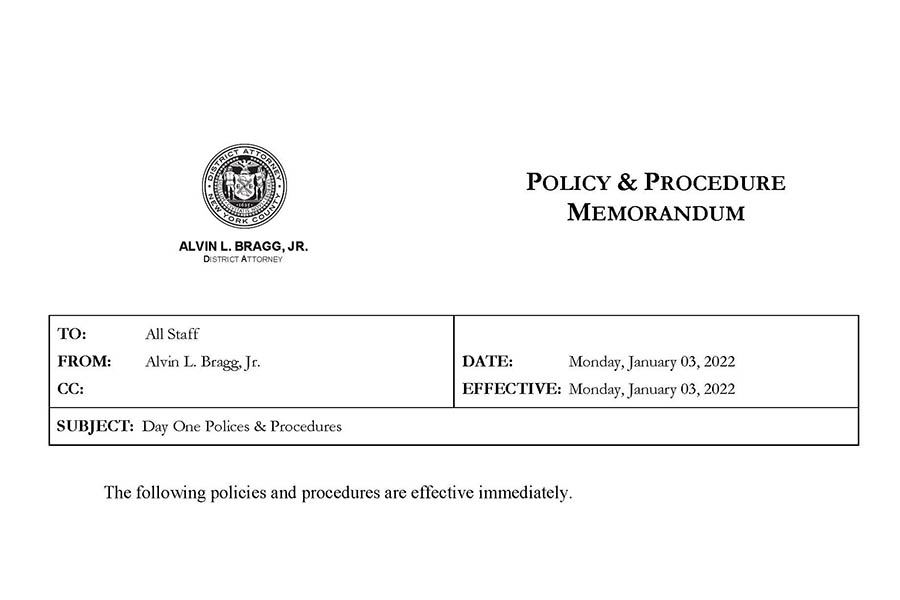Newly sworn in Manhattan District Attorney Alvin Bragg issued new policies and procedures to his staff that substantially altered existing office policy in prosecuting criminal cases. The new directive defers certain prosecutions for lower-level offenses, reduces certain felony offenses, prohibits seeking life in prison without parole, and prohibits seeking bail except in limited violent offenses.
Bragg ran on a progressive platform that promised to overhaul the system and to reduce the number of people behind bars. His first major directive seeks to implement his ideology toward charging, bail and sentencing in the face of rising crime rates throughout the city and calls from officials and the public to crack down on crime. The new policies are a reflection of the DA’s personal experiences growing up in New York, as well as his goal to link safety with fairness.
In broad strokes, the new policy calls for
- More diversion and alternatives to incarceration for individuals in crisis and youthful offenders;
- Reduction in pretrial incarceration, recognizing the ongoing multitude of problems in Rikers, limiting such incarceration to violent crimes and limited exceptions;
- A focus in sentencing on accountability rather than the length of the sentence as research shows that certain longer sentences do not deter crime or provide greater community safety;
- Limit youthful offenders (up to age 25) in adult court system; and
- Actively support those reentering society after their prison terms.
This sweeping directive affects decisions regarding charging, pretrial
detention, dispositions, cases involving juveniles and charges against non-citizens. It represents a major shift in existing policy that called for charging the most serious offenses possible in the majority of cases. As for non-citizens, the directive calls for avoiding dispositions that would affect immigration status and lead to potential removal from the country.
Many of the directive’s goals are laudatory and long overdue. Prosecutors around the country routinely and reflexively charge the most serious possible offenses rather than examining the specific facts, background of the individuals, mitigating circumstances and other relevant information. At the charging phase, defendants are broadly categorized and face lengthy prison sentences.
The new policy requires ADAs to examine each case individually, based on the type of the offense, the age and circumstances of the defendant and other relevant factors. By doing so at the charging phase, rather than at sentencing where many jurisdictions limit judges’ discretion through sentencing guidelines and mandatory-minimum laws, DA Bragg believes that fairness will result in greater safety to the community. Time will tell whether the new policy will yield the intended results.
Stahl Gasiorowski Criminal Defense is here for all your criminal legal needs. We are experienced in all types of complex criminal matters involving a many types of electronic evidence. To contact the firm’s NJ office, call 908.301.9001 and to contact the firm’s NYC office, call 212.755.3300, or email Mr. Stahl at rstahl@stahlesq.com.



